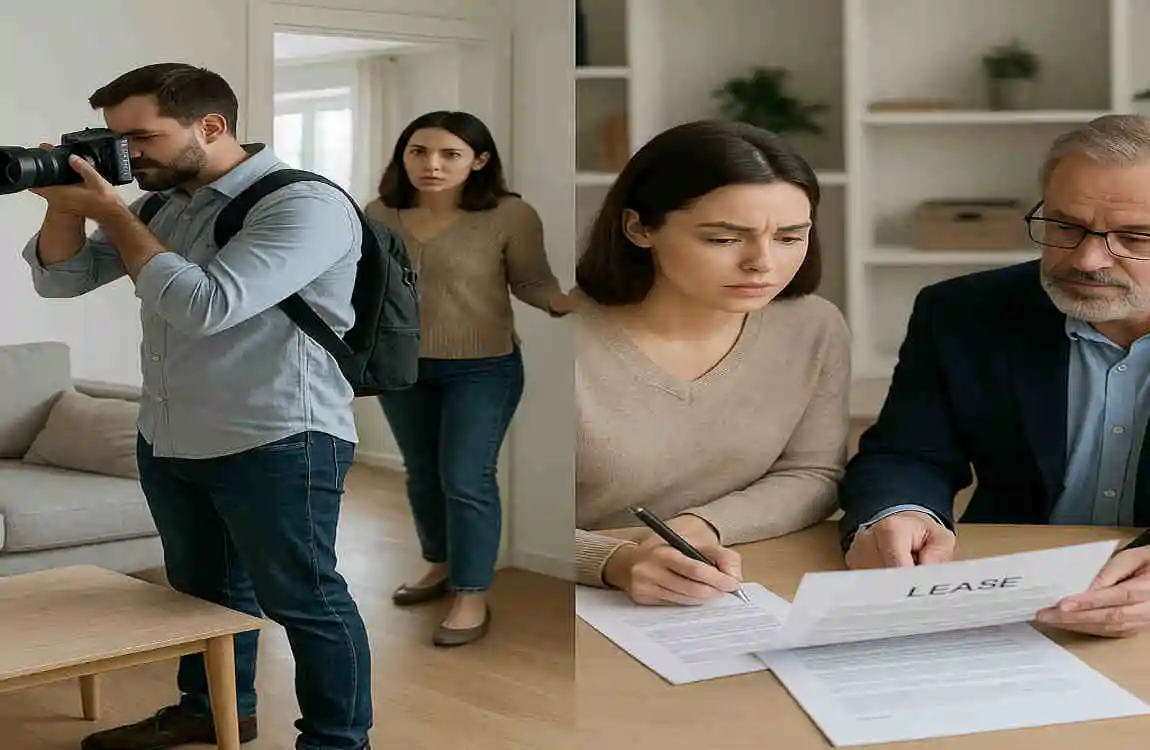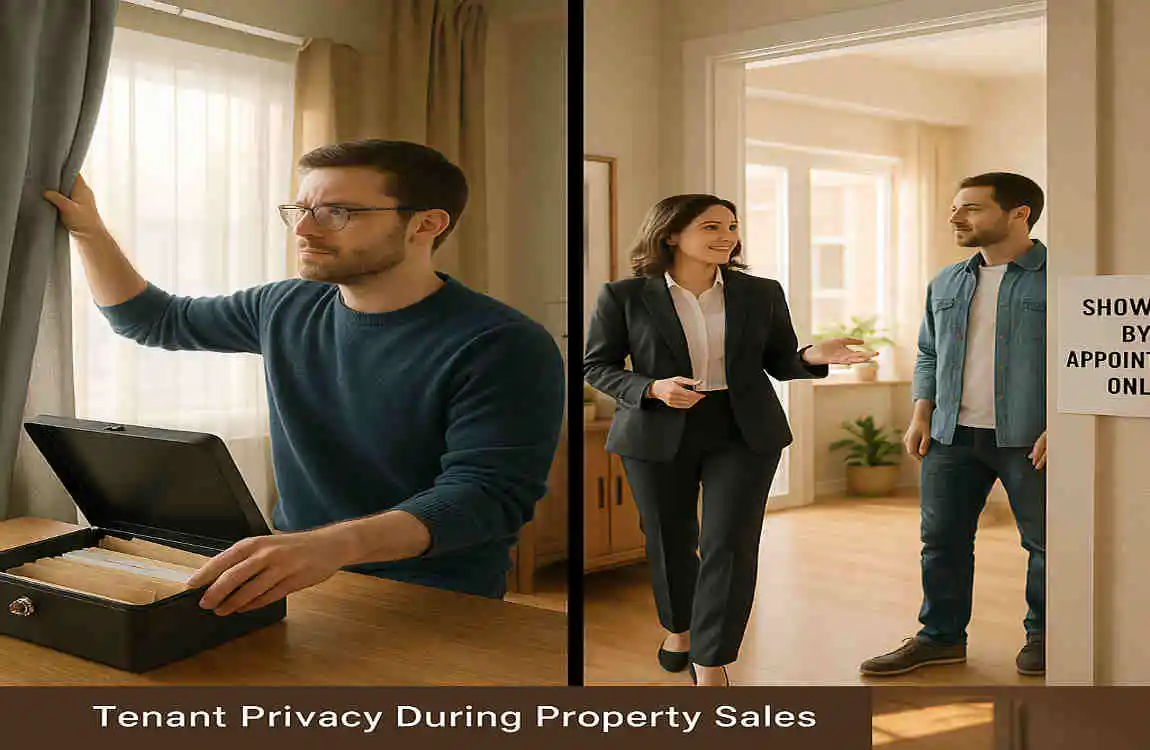Imagine you’re sitting in your living room, enjoying a quiet evening at home. Suddenly, your landlord knocks on the door and asks to take pictures of your space to help sell the property. You might feel uneasy about this request, and you’re not alone. Many tenants wonder, “Can my landlord take pictures of my house to sell?” Understanding your rights and the legal boundaries surrounding this home issue is crucial.
We’ll dive deep into the world of tenant-landlord rights during a property sale. We’ll explore the legalities of photography, discuss privacy concerns, and provide practical advice for both tenants and landlords. By the end of this article, you’ll have a clear understanding of your rights and how to navigate this situation with confidence.
What Rights Do Landlords Have When Selling a Property?

When a landlord decides to sell their property, they have certain legal rights to show and market the home. However, these rights come with responsibilities and obligations towards their tenants.
Legal Rights of Landlords
Landlords have the right to:
- Show the property to potential buyers
- Take reasonable steps to prepare the property for sale
- Access the property for inspections and repairs
However, these rights are not absolute. Landlords must still respect their tenants’ privacy and adhere to local laws and regulations.
General Landlord Obligations
Even during a property sale, landlords are obligated to:
- Provide tenants with proper notice before entering the property
- Maintain the property in a habitable condition
- Respect the tenant’s right to quiet enjoyment of the rental unit
Accessing the Property for Inspections or Photos
When it comes to taking pictures or conducting inspections, landlords must:
- Give tenants reasonable notice (usually 24-48 hours)
- Enter the property at reasonable times (typically during daylight hours)
- Limit their access to what is necessary for the sale process
Remember, as a tenant, you have the right to request specific times or conditions for home photography or inspections. Don’t hesitate to communicate your needs and concerns with your landlord.
Can My Landlord Take Pictures of My House to Sell?

Now, let’s address the central question: Can your landlord legally take pictures of your home to sell the property? The answer depends on various factors, including your location and the specific circumstances.
Legal Stance on Photographing a Tenant’s Home
In general, landlords have the right to take pictures of the property for sale purposes. However, there are important considerations:
- Written Consent: In some jurisdictions, landlords may need to obtain tenants’ written consent before taking interior photos.
- Restrictions on What Can Be Photographed: Landlords should avoid photographing personal belongings, sensitive areas (like bedrooms or bathrooms), or anything that could invade the tenant’s privacy.
- Tenant Privacy Rights: Tenants have a right to privacy in their homes, even during a property sale. Landlords must balance their need to market the property with respect for their tenants’ privacy.
Specific Laws and Regulations
Laws and regulations regarding photography during a property sale can vary significantly by state or country. For example:
- In California, landlords must provide 24 hours’ notice before entering the property for any reason, including photography.
- In the UK, tenants have the right to “quiet enjoyment” of their rental property, which may limit a landlord’s ability to take intrusive photos.
It’s essential to research the specific laws in your area to fully understand your house rights and obligations.
When is Photography Considered a Privacy Violation?

While landlords have some living rights to photograph a property for sale, there are situations where photography can cross the line into a privacy violation.
What Constitutes an Invasion of Privacy?
An invasion of privacy occurs when a landlord:
- Takes pictures without proper notice or consent
- Photographs sensitive areas or personal belongings
- Uses photography to harass or intimidate tenants
- Shares photos that reveal the tenant’s identity or personal information
Examples of Intrusive or Excessive Photography
Some examples of potentially intrusive photography include:
- Taking close-up shots of personal items, like family photos or documents
- Photographing private spaces, such as bedrooms or bathrooms, without the tenant’s consent
- Using wide-angle lenses to capture more of the tenant’s personal space than necessary
Recognizing Violations of Your Rights
As a tenant, it’s essential to understand your rights and recognize when they may be violated. If you feel uncomfortable with the photography process or believe your privacy is being invaded, don’t hesitate to speak up.
The Role of Boundaries in Photography
When it comes to photography during a property sale, boundaries are crucial. Landlords should focus on:
- Common areas, like living rooms and kitchens
- Neutral shots that showcase the property’s features without invading the tenant’s personal space
- Respecting the tenant’s wishes regarding what can and cannot be photographed
By setting clear boundaries and communicating openly, both landlords and tenants can navigate the photography process with respect and understanding.
How Can Tenants Protect Their Privacy During a Property Sale?

As a tenant, you have the right to protect your privacy during a property sale. Here are some steps you can take to ensure your rights are respected:
Tenant Rights to Notice
Before any photography takes place, your landlord must provide you with proper notice. This notice should:
- Be in writing (email or text message may be acceptable, depending on local laws)
- Specify the date and time of the photography
- Give you enough time to prepare (usually 24-48 hours)
If your landlord fails to provide proper notice, you may be able to deny them access to your modern home.
Requesting Limitations or Specific Conditions
You have the right to request limitations or specific conditions on the photography process. For example, you might ask your landlord to:
- Avoid photographing certain areas of your luxury home
- Blur or remove any personal items from the photos
- Schedule the photography at a time that works best for you
Don’t be afraid to communicate your needs and concerns with your landlord. They should be willing to work with you to find a solution that respects your privacy.
Legal Steps if Rights are Violated
If you believe your rights have been violated during the photography process, you may have legal recourse. Consider taking the following steps:
- Document the violation (e.g., take photos or videos of the intrusive photography)
- Send a written complaint to your landlord, detailing the breach and requesting that they stop
- Contact a local tenant rights organization or attorney for advice and assistance
- File a complaint with your local housing authority or court system, if necessary
Remember, you have the right to protect your privacy and hold your landlord accountable for any violations.
Recommendations for Tenants
To protect your privacy during a property sale, consider the following recommendations:
- Keep your personal belongings organized and out of sight before photography takes place
- Take your own photos or videos of the photography process to document what was captured
- Request copies of any pictures taken to ensure your privacy is respected
- Communicate openly and honestly with your landlord about your concerns and needs
By taking these steps, you can ensure that your home privacy is protected during the property sale process.
Legal Remedies and Dispute Resolution

If you find yourself in a dispute with your landlord over photography during a property sale, there are legal remedies and dispute resolution options available to you.
Handling Disputes with Landlords
When a dispute arises, consider the following steps:
- Try to resolve the issue through open communication and negotiation with your landlord
- Document all communication and attempts to resolve the dispute
- Seek the assistance of a mediator or tenant rights organization to help facilitate a resolution
- If necessary, consult with a local attorney who specializes in landlord-tenant law
Remember, it’s always best to try to resolve disputes amicably before resorting to legal action.
Legal Options Available
If your attempts at resolution fail, you may need to explore legal options, such as:
- Filing a complaint with your local housing authority or court system
- Seeking a court order or injunction to stop the intrusive photography
- Pursuing a lawsuit against your landlord for invasion of privacy or breach of your lease agreement
Consult with a qualified attorney to determine the best course of action for your specific home situation.
Best Practices for Landlords and Tenants

To ensure a smooth, respectful property sale process, both landlords and tenants should follow best practices for photography.
For Landlords: Respectful and Legal Photography
As a landlord, you can take the following steps to ensure your photography practices are respectful and legal:
- Always provide proper notice to tenants before taking photos
- Obtain written consent from tenants, if required by local home laws
- Focus on common areas and avoid photographing sensitive or private spaces
- Respect the tenant’s wishes regarding what can and cannot be photographed
- Use neutral shots that showcase the property’s features without invading the tenant’s personal space
By following these best practices, you can maintain a positive relationship with your tenants while successfully marketing your property for sale.
For Tenants: Protective Measures and Communication
As a tenant, you can protect your privacy and ensure a smooth property sale process by:
- Communicating openly and honestly with your landlord about your concerns and needs
- Requesting limitations or specific conditions on the photography process
- Keeping your personal belongings organized and out of sight before photography takes place
- Documenting the photography process to ensure your privacy is respected
- Seeking legal advice or assistance if you believe your rights have been violated
By taking these steps, you can ensure that your privacy is protected during the property sale process.
Tips for Both Sides
To ensure a successful and respectful property sale, consider the following tips for both landlords and tenants:
- Maintain open and honest communication throughout the process
- Be willing to compromise and find solutions that work for both parties
- Respect each other’s rights and privacy concerns
- Document all home agreements and understandings in writing
- Seek the assistance of a mediator or legal professional if disputes arise
By following these tips, you can navigate the property sale process with confidence and respect for all parties involved.




